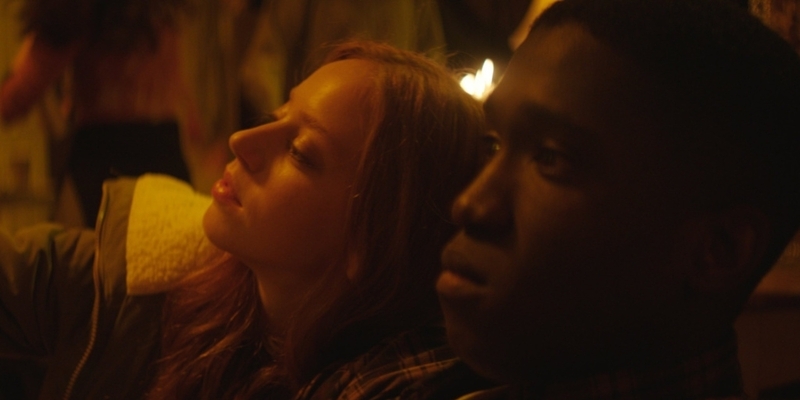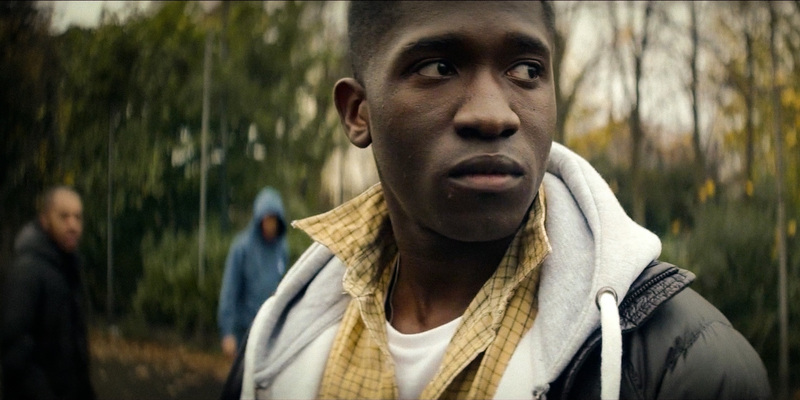
Review by
Benjamin Poole
Directed by: Darragh Carey, Bertrand Desrochers
Starring: Ola Orebiyi, Lily Newmark, Jaime Winstone, Craige Middleburg

In the years following World War II, Britain was on its arse. Major cities
had been bombed and the loss of life caused by global combat had resulted
in an injurious labour shortage. Consequently, the British government
urged mass immigration from the former countries of the British Empire and
Commonwealth to fill the gaps. Fortuitously, many West Indians were
attracted by better prospects in what they had been conditioned by
imperial propaganda to recognise as their mother country. Almost
immediately, however, Atlee’s cabinet started to get itchy (racist) feet,
with a committee established to restrict international movement: it was
refused, as in actuality there were loads and loads of jobs to fill, and,
in fact, if it hadn’t been for the hard-working immigrants putting in the
hours at the rail network, the NHS and public transport, fuck knows what
state post-war Britain would have been in. Didn’t stop a significant
portion of the British public treating their now fellow countrymen with
prejudice though: aside from the misery of everyday racism, there were
institutional barriers too, with trade unions often refusing to support
black workers, and not only entrance to public spaces such as pubs
declined, but also access to housing, private or otherwise refused (for
further reading regarding the legacy of the Windrush generation, pick up
Rachel Edwards’ superb new thriller novel 'Lucky', which touches upon the
scandal, or simply watch the news).
The nearest labour exchange to where passenger ships docked was in
Brixton, and the new arrivals were given local accommodation in this
district. Today, the borough of Lambeth has the largest black population
in London. And perhaps you would hope that in 2021, the country may have
developed and grown, and prejudice and division would be ghosts of the
past. I dunno: ask the Unison Black Workers Group who believe that
redundancies from Lambeth council are due to ‘victimisation on the grounds
of race’; ask BLM protestors; ask Meghan Markle.
Or take in Darragh Carey and Bertrand Desrocher’s
(directors) and Rupert Baynham and Chi Mai’s (writers, along
with Carey) A Brixton Tale with its beautiful, doomed black
boy Benji (Ola Orebiyi), a kindly resident of Brixton who
meets-cute with pale and interesting Leah (Lily Newmark), a rich
kid who is making digital content based on urban culture for some sort of
narrowcast media publisher.

Leah falls in love with Benji while concurrently making him her subject.
And as you watch the opening of the film, allow the by-now-over-familiar
‘hey guuuuuyyys’ mode of address in the early YouTube scenes, ignore weed
as a visual shorthand for proles (all classes do it, surely), and don’t
fear a potentially heavy-handed morality, either, as
A Brixton Tale is one of the most quietly commanding British
films of recent years, providing an intelligent look at racial identity in
the capital.
The primary power of A Brixton Tale comes from the central
performances. As a character who is positioned to react to the various
forces and situations that act upon him, Orebiyi is magnetic, with a
heart-breaking stoicism compelling us as his counterpoint Leah (or, as her
parents call her, Ophelia - yikes!) draws him into her world of leafy
suburbs, lovely thick rails of cocaine and an unwanted starring role
within south London’s cottage art industry.

A Brixton Tale’s overriding theme is obviously the exploitation of perceived black
authenticity via privileged white media, yet the film never patronises us
or its representations by drawing simple binaries. When Benji and
Leah are on screen together, there are sparks enough to power all of
Electric Avenue for one thing, and for another there is Newmark’s
performance. Leah is gnomic, haunted, and in her own way compelled by
circumstances (this is, after all, the generation where something must be
mediated via a video or camera filter for it to have any weight in their
estranged, insubstantial digital existence: a condition which causes
specific issues for Leah in the film's gloomy last act). Newmark is
something else - at around the 40 minute mark, there is a close up of her
eating spaghetti, and, somehow, it’s the most mysterious and fascinating
shot I’ve seen all year.
Coercion for Leah comes from her boss, played by Jaime Winstone,
who encourages Leah to push for more vivid scenarios when recording Benji,
inviting the implication that media representations are not only
constructed but incited by the form. The casting of Winstone (who it’s
always nice to see) is shrewd, too. With
A Brixton Tale released a generation after her instrumental
roles in the similar narrative circumstances of
Kidulthood and Bullet Boy there is an implied
meta-textual contrast between what has stayed the same in the youth
cultures of urban London, and what has since mutated.

Another instructive distinction is drawn between Benji and his oppo Archie
(Craige Middleburg), a white lad who represses his sexuality
beneath increasingly dangerous drug use and macho posturing, which seems
to rely on an exaggerated, self-conscious mimicry of black patois and
posturing. ‘Where you man going bruv?’ he yells, his voice pitched
slightly too high for his bravado to convince as genuine idiom. Archie’s
assumption of a stereotype is one of the subtle instances of othering
which the film explores, along with inevitable police racism and the
divisions within divisions which make up yute territories. The pigs are on
to Benji because they want his big man ting cousin, they drop him off in a
rival estate to shit stir, while his cousin himself is against his
relationship with Leah from the off: pressure from all sides.
To match the superb character work, the subtle but insistent thematic
probing, the filmmaking itself is a wonder. In a 70 minute or so runtime,
no minute is wasted. The narrative seems to skim along towards important
moments - Leah’s gallery debut (this film shares ideas and, indeed,
specific imagery with Nia DaCosta’s
Candyman
– there must be something in the air), a revenge porn subplot, a criminal
destiny - with the camera weaving, spying, and at times holding back when
it isn’t getting in someone’s face: a mise-en-scene which, in its
intrinsic momentum, lyrically captures the fleeting experiences and
vulnerabilities of youth.

A Brixton Tale is on UK/ROI VOD now.

